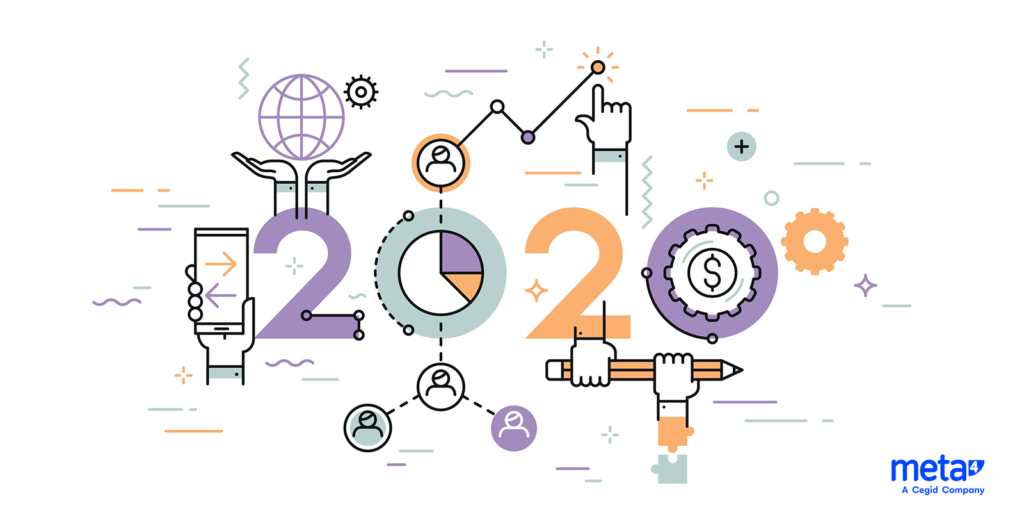We have just stepped into 2020 , not just a new year, but a new decade, we can predict with total certainty that change and evolution in the world of HR will continue apace! Technological innovations, societal and demographic shifts, lifestyle and personal choices, as well as today’s economic realities all blend to shape the trends that we are see unfold in organizations.
Here we outline some of those HR trends that we see impacting Meta4’s clients around the world, and which research suggests will be part of our lives in the years ahead. Better said, these are the trending questions that pose practical issues for us within our teams and organizations – the challenge lies in how do we best respond?
How do we hear employees?
We all like to be listened to. Our employees expect to have their say, in the moment, and to get responses. Companies who listen are the ones who see increased revenue and productivity, with that they also benefit from reduced employee turnover.
To positively impact the employee experience, which has become increasingly relevant, we need to listen in the right moment – most employees will provide feedback four times a year through the questions you put to them, but you will want to personalize these based on the employee’s generation or stage in their organizational journey. Find those points when employees want their voice to be heard, and then listen to them.
Having listened, make sure employees see actions being driven as a result of their input. Be transparent about what you’ve heard, how you’re going to respond, and what you expect to change as a result.
How do we handle data?
Spend on talent analytics is the fastest growing line item in a typical HR budget, with 75% of organizations increasing their predicted spend, and the average talent analytics team has been tripling in size over the past three years.
The data we gather informs our people decisions in all areas based on questions we ask ourselves, questions like who should we recruit, from where, how should we develop and grow them, what do they want in terms of reward, and how can we retain them?
But while in recent years our focus has been around the question, ”What data should we collect?”, there is now a shift towards asking the next question ”How do we ethically use the data we collect?” Wearables, social media and AI in general are here to stay and they are increasingly posing new ethical questions around what is inside and outside the organization; whatever is outside is out of scope and therefore out of an organization’s remit, control and touch?
HR has a pivotal role in defining the ethical position organizations take in response to such questions.
How do we define career?
The future of work strategist, Heather McGowan predicts that in future we will typically have 16 different jobs across 5 different industries. Two thirds of the jobs of the future don’t even exist today. Within this shifting and evolving context, the traditional lines between education and employment are radically altered and eroded. McGown goes on to point out that, “Education becomes learning, with no end-state…Success measures are the ability to learn, adapt and create new value.”
In this new environment, new skills will be demanded that don’t exist yet. We already know millennials place development as a higher priority than traditional benefits. We also know that traditional career ladders with job title changes and promotions are becoming obsolete.
HR needs to lead the thinking on how we set up working environments to foster continuous learning, to provide transparency on opportunities and moves, and to enable employees to jump from one discipline or business unit to another as they learn and contribute, which they will do in very different and less linear ways than in the past.
How do we learn and develop?
While the rise of chatbots has been lauded in removing the mundane repetitive tasks from many jobs, what has been largely ignored is that around half of all traditional on-the-job learning opportunities are being eliminated with the introduction of these new technologies. The entry level experiences of the past, which enabled us to learn and practice our foundational skills, have been eliminated, leaving only work in the equation which requires higher levels of expertise.
HR needs to develop learning strategies by not asking just, “How do we develop new digital skills in our employees?”, but more importantly, “How do we develop all the skills we need as AI eliminates many learning opportunities?”
How do we let people in?
Just as we let people into our homes and let them see how we are, we need to take this to the workplace. Over 70% of employees say their employer should show more transparency. Tools such as Glassdoor, Blind and RatemyProfessor are enabling this kind of transparency. Those companies leading the way in this area are offering radical transparency by making all salary data freely available as well as making managerial performance reviews widely available.
HR needs to go a step further outside their comfort zone on transparency and on what information to share with employees by asking not, “How do we control our narrative?”, but rather, ”How do we meet our employees’ growing need for transparency?”
How do we manage?
The past decade has seen a ten-fold increase in the average organizational spend on managerial development. The result? Managerial effectiveness remains unchanged. This investment seems to have had negligible impact. So, what didn’t work?
Yet at the same time, Gartner predicts that almost 70% of current managerial tasks will be automated within five years.
This means we should be thinking now more deeply about re-defining what it means to be a Manager to improve managerial effectiveness. For instance, should managers be primarily focused on releasing team potential, on providing disruptive thinking, on building collaboration? The sooner we re-imagine the role of our managers, the sooner we can re-imagine our talent acquisition, development and performance processes accordingly.
How do we work together?
We are reading more and more research that continues to reinforce what we already know; lasting success comes from effective teams and not solely from effective individuals. Google’s study of 180 teams investigated what indicators most affected high performance. The answer is creating psychological safety—creating environments where we can fail, show ignorance, ask questions, and learn.
So, if we know that growth and success results from collaboration and such psychological safety, what does that mean for our performance management approaches? How can we be incorporating collaboration into our goal-setting right from the start? How can we be describing teamwork as an action—something we do, how we behave, rather than as a vague attitude? Each team should be translating the what, how and with whom of collaboration into their own context to make it real.
Again, HR must lead the way in 2020
HR leaders and teams have a critical role to play in this new environment with all the evolving technologies, demographic and societal trends we are experiencing, and which look set to continue.
If employees are to thrive and grow in our organizations and to give of their best, then HR will need to lead in listening, in clear strategic thinking, and in fostering collaboration among employees.
While new technologies can help immeasurably when viewed as a tool to contribute to well thought-out organizational objectives and priorities, that alone will not be enough. HR that can harness such tools while leading across the organization will go a long way to helping the company get ahead in this new decade.






